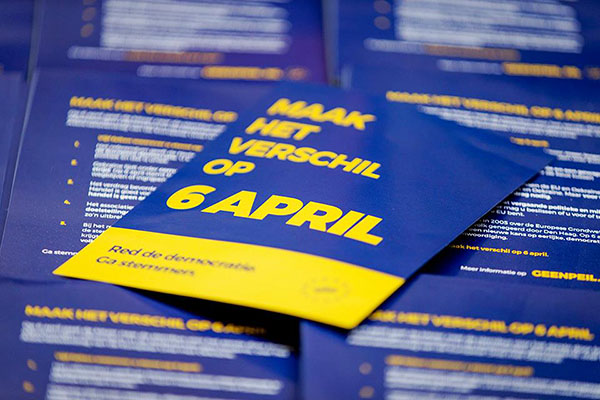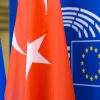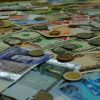
The Dutch will be voting tomorrow, 6 April, in an odd referendum that could trigger another institutional crisis in Europe: the vote concerns the Association Agreement between the Ukraine and the EU, signed in 2014 and currently being applied only provisionally and in part. The opinion polls have alternated between a clear victory for the ‘no’ camp –reflecting voters’ anger, the mounting scepticism regarding Europe in its current form and mistrust regarding the possibility of Ukraine joining the EU, with this agreement perceived as the first step– and a tie, although one week before the vote half the voters had not yet made up their minds. The President of the European Commission, Jean-Claude Juncker, has warned that a Dutch rejection ‘would open the door to a continental crisis’. Putin must be smiling to himself and Juncker is probably exaggerating, but if the ‘noes’ win it could trigger another institutional crisis and a troublesome precedent.
Why the Ukraine? To begin with because it is the first chance that Dutch Eurosceptics have had to subject something to a referendum using the new law of 2015, approved four weeks before the parliamentary ratification of the agreement with the Ukraine. The satirical website GeenStijl has taken it upon itself to promote the ballot, backed by two Eurosceptic organisations: the Forum for Democracy and the EU Citizens’ Committee. And behind them lie the Socialist party (not to be confused with Labour, a coalition partner of the Liberals in parliament), Geert Wilders’ Party for Freedom, and others, including the Party for Animals. It was in fact these sponsors who placed an initiative before parliament in 2014 whereby any transfer of sovereignty to the EU would have to be put to a referendum, on the grounds that Dutch voters had lost their influence in the Union.
What the parliament actually did, as Simon Otjes ably explains, was to approve a new law on consultative referendums whereby a ballot can be held if 300,000 signatures are collected (10,000 signatures in the four weeks following the passing of a new law and the remainder six weeks later, from an electorate numbering 12.5 million). This is the first time it has been applied, and the agreement with the Ukraine has presented the first opportunity. With the help of social networks they attracted 427,000 signatures in six weeks using an app to collect, print and submit them within the deadline to the Dutch Electoral Council. For the result to be valid at least 30% of the electorate must vote (something that is not assured in this case, given that an opinion poll in February indicated that half of voters were not aware of the referendum), and it must be approved by more than 50% of the votes.
The referendum is ‘suspensive’; in other words, it suspends the application of the law in question until the ballot takes place. And although the vote is advisory and non-binding, the parliament –which had already endorsed the agreement with the Ukraine in 2015, pending only the Netherlands formally notifying its ratification– has already indicated that it will respect the result. The coalition government led by Mark Rutte, of the centre-right VVD party, while advocating ratification, has been neither particularly active nor enthusiastic in a campaign in which it has little to gain, with elections looming next year, as Rem Korteweg points out in an analysis for the CER. The sponsors of the referendum complain that Brussels has ignored them and has been applying the agreement in part (in the area that is the sole competence of the European Commission) since the end of 2014, and the Deep and Comprehensive Free Trade Area, its main element, since January 1st. But the Dutch veto would be a severe blow for the new Ukrainian President, Petro Poroshenko, and a victory for Putin and Russia.
Naturally other Eurosceptics, such as Britain’s Nigel Farage of the UK Independence Party (UKIP), back the ‘no’ camp in the Dutch vote, and if the latter side wins it will stoke rejection of Europe in other countries. It should not be forgotten that the ill-fated European Constitution (European Constitutional Treaty) was derailed by two referendums organised by two founding members of the European project in 2005: one held in France and the other in the Netherlands, no less (where 61.6% of voters rejected it, although 85% of parliamentarians had endorsed it). In the current case it is a matter of insisting on the idea that European progress must be controlled from below, not from above. Another factor is a certain suspicion that this agreement could be a first step in paving the way to the Ukraine’s entry into the EU, when the latter is suffering enlargement fatigue, not to mention the democratic deterioration that some the EU’s eastern members –such as Poland, the Czech Republic and Hungary– are going through.
Also weighing on the views of many Dutch voters may be the fact that 193 of their compatriots died in the downing of Malaysian Airlines Flight MH17 from Amsterdam to Kuala Lumpur, in the Donetsk region in July 2014, out of a total of 298 passengers and crew. It is unclear whose finger was on the trigger –whether it was the pro-Kiev or pro-Moscow forces in the Eastern Ukraine– but various evaluations of relations with Russia lie behind the referendum.
If the ‘no’ camp wins, a solution will have to be sought: renegotiating some of the agreement’s points, an opt-out for the Netherlands or another formula currently being considered in Brussels. A new institutional conflict could result, possibly leaving the Ukraine even more exposed.
Regardless of the outcome, this ballot, in a Europe that is hostage to referendum fever, sets a precedent for submitting other important agreements to the Dutch electorate such as the EU-Canada pact (already sealed), and the most important foreign deal the EU has ever negotiated, if indeed it reaches a successful conclusion: the famous TTIP (Transatlantic Trade and Investment Partnership). More headache-inducing governance issues for an already complicated EU.


